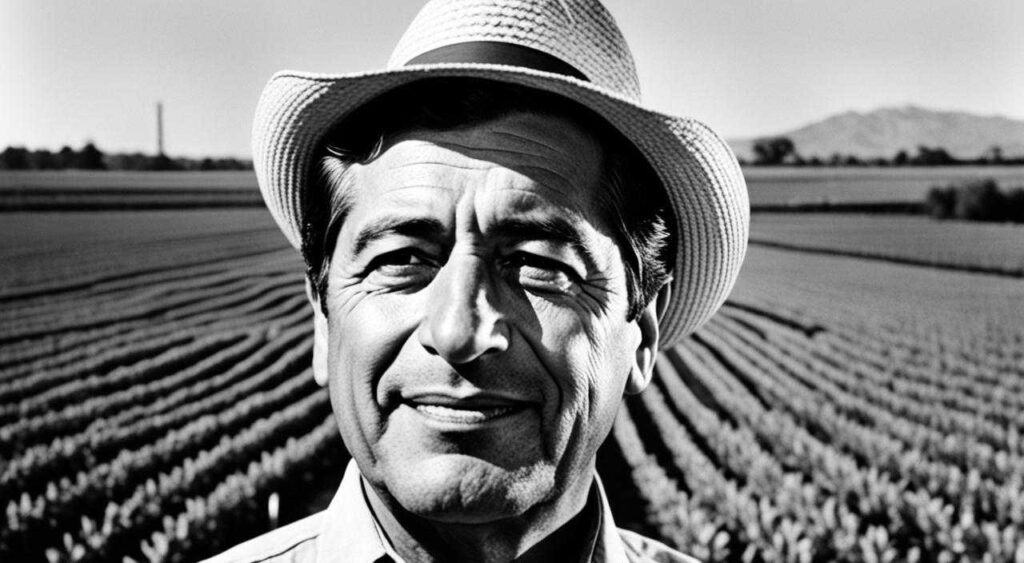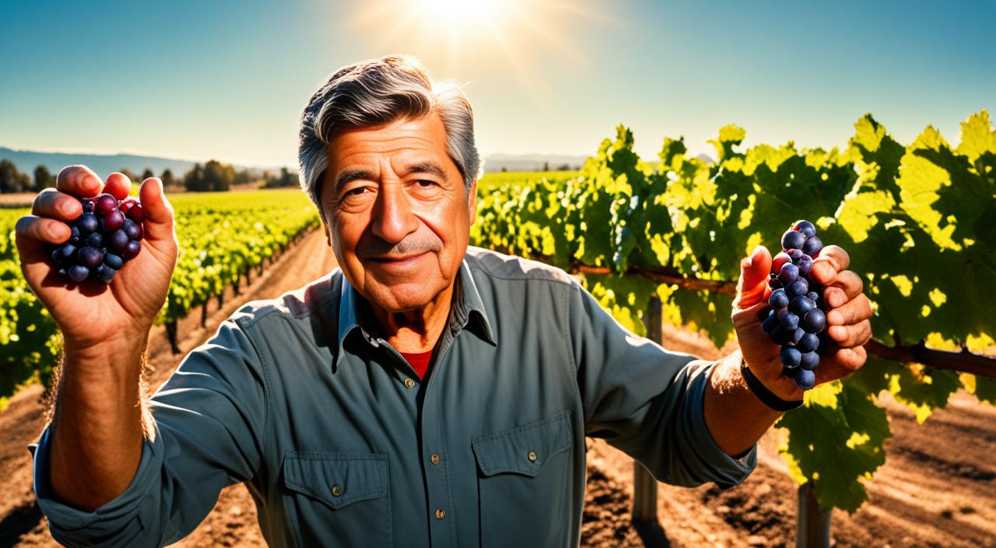Cesar Chavez Day is a holiday in several U.S. states. It’s held on March 31 to honour the birth and legacy of American civil rights and labour activist Cesar Chavez. Across the country, Cesar Chavez Day celebrates him. It recognizes his accomplishments. He was a Mexican American farm worker, labour leader and activist. Here is a detailed look at why we celebrate this day.
Cesar Chavez’s Background
Cesar Estrada Chavez was born on March 31, 1927, in Yuma, Arizona to a Mexican-American family. He grew up in a small home on his grandfather’s farm and experienced hardship and discrimination from a young age.
At 10, his family lost their farm in the Great Depression. They became migrant farm workers. They travelled across the southwest United States to pick crops. The work was gruelling and paid little. These experiences shaped his life mission to fight for improved pay and working conditions for farm workers.
Early Activism
After serving in the U.S. Navy during World War II, Cesar Chavez began organizing Mexican American communities in San Jose, California in 1952. He took on racial discrimination in housing, schools, businesses and voting rights.
In 1962, Chavez founded the National Farm Workers Association. Later, it was called the United Farm Workers Union or UFW. He began organizing strikes and boycotts to protest for better wages and conditions. For over three decades, he led marches, fasts and strikes to raise awareness.
Major Accomplishments
Some of Cesaer Chavez’s most significant accomplishments include:
- Delano grape strike (1965-1970) – The strike of California grape growers led to the first UFW union contracts in 1966. At its height, over 10,000 workers participated.
- Co-founded the United Farm Workers (UFW) union – UFW organized strikes and boycotts over decades leading to new protections for hundreds of thousands of farm workers.
- California Agricultural Labor Relations Act of 1975 – The act was passed after a historic voting rights struggle led by Chavez. It gave collective bargaining rights to farm workers.
- Increased wages and improved working conditions – Thanks largely to Chavez’s efforts, wages for grape workers rose from $0.90 to $3.35 per hour and unsafe use of pesticides was banned.
Other Major Contributions:
- Organized the largest farm worker march in U.S. history of 50,000 workers in Sacramento in 1966
- Led boycotts against table grapes and lettuce resulting in historic union contracts
- Held 25-day fasts to protest violence against striking workers
- Formed nationwide coalitions of students, religious groups and minorities
- Inspired generations of activists with nonviolent tactics like fasts, strikes and marches

Why We Honor Cesar Chavez
There are several key reasons why Cesar Chavez’s birthday on March 31 is commemorated across the United States:
Brought national attention to farm worker issues
For over three decades, Chavez organized high-profile, peaceful protests. These included marches, fasts, and strikes. The goal was to bring attention to low wages and bad working conditions. His efforts brought the plight of hundreds of thousands of farm workers into the national spotlight.
Championed nonviolent activism
Inspired by Gandhi and Martin Luther King Jr., Chavez insisted on nonviolent civil disobedience to bring change. At times he even fasted to curb violent tendencies and set a moral example for the movement. His commitment to peaceful activism made him an enormously impactful and unifying leader.
Empowered immigrant, Latino and minority communities
Chavez promoted ethnic pride, civic participation and empowerment of immigrant and disenfranchised communities. He formed cross-cultural and interracial coalitions. They were to build solidarity and increase their collective bargaining power. It was against discriminatory policies.
Improved wages and conditions for farm workers
Thanks to Chavez’s pioneering efforts, wages and conditions improved a lot. He worked for several decades in California’s agricultural industry. This included higher wages, health insurance, pensions, and protections against dangerous pesticides.
Left enduring legacy as a civil rights icon
Along with Martin Luther King Jr., Chavez left an indelible mark as one of the most significant civil rights leaders in American history. His birthday honours and preserves his legacy. He was a paradigm of nonviolent activism. It still inspires marginalized communities today.
When and Where We Celebrate Cesar Chavez Day
Over a dozen U.S. states observe Cesar Chavez Day as an official holiday every year on March 31, the civil rights leader’s birthday.
States that celebrate Cesar Chavez Day include:
- California
- Colorado
- Texas
- Utah
- New Mexico
- Arizona
- Michigan
- Wisconsin
Many cities and school districts recognize the day. They celebrate with parades, marches, and service projects. They also hold educational events about Chavez’s life. For millions across the Southwest, it is a major cultural holiday. It honors shared civil rights history and Latino power.
How We Celebrate Cesar Chavez Day
Cesar Chavez Day celebrations vary across the country but often involve aspects like:
Marches and Parades
- Large public marches and gatherings with banners featuring Chavez’s image and slogans from the farm worker movement. Participants chant popular slogans like “Si se puede!” (Yes we can) That echoes Chavez’s empowering message.
Fasts and Food
- Community fasts emulating Chavez’s use of fasting for nonviolent civil disobedience. Many eat simple meals of bread and fruit identifying with the struggles faced by generations of farm workers.
Chavez’s Grave Site
- National Chavez Memorial – The site has beautiful memorial gardens. They are at the Cesar Chavez National Monument and the historic site of the United Farm Workers headquarters in La Paz in Keene, California.
Educational Events
- Schools and universities hold events to highlight Chavez’s history, values, and legacy. They do this through speeches, performances, art exhibits, essay contests, and discussion groups. These events explore his vision.
Service Projects
- People do food drives, community gardens, and cleanups. They also do volunteer activities to give back to the community. This is all in Chavez’s spirit of service. He supported poor and marginalized groups.
Cultural Performances and Exhibits
- Latino music, dance and performances celebrating Chavez’s cultural impact. Galleries and museums feature collections chronicling Chavez’s legacy as part of civil rights history.
Cesar Chavez Day is celebrated through big public events. It is also marked by intimate meals and gatherings. The centres are on his timeless vision. It is for equality, nonviolence, service, and helping disadvantaged communities.
Why Cesar Chavez Day Matters
The holiday honours the leader’s remarkable legacy in the farm labour movement. It also promotes many important themes that remain relevant today:
Promotes nonviolent activism – Chavez’s steadfast adherence to nonviolent tactics like peaceful protests, fasts and boycotts remains an inspiration and model for social movements.
Supports immigrant rights – Chavez fought discrimination faced by immigrant workers and minorities, a mission that continues as immigration reform struggles persist decades later.
Uplifts Latino leaders – As the most influential Latino civil rights champion, Chavez endures as a cultural icon upholding the contributions, strengths and solidarity of Latino communities.
Highlights farm workers’ rights – Bringing broader awareness to the harsh conditions faced by farm workers supports better protections and conditions for this overlooked but vital workforce.
Unites marginalized groups – Chavez built and bridged multicultural coalitions, a much-needed model for overcoming divisions between disadvantaged groups seeking social justice today.
For these reasons, Cesar Chavez Day promotes nonviolent resistance. It also promotes civil rights, cultural pride, and economic justice. It also promotes the idea of marginalized groups banding together. These ideals remain deeply meaningful today. The holiday ensures Chavez’s transformative grassroots legacy lives on.
Key Facts About Cesar Chavez
| Category | Details |
|---|---|
| Birth and Early Life | Born in 1927 in Arizona; grew up in a Mexican-American family of farm workers |
| Early Activism | Quit school after 8th grade to work full-time as a farm laborer; joined Community Service Organization (CSO) in 1952 to work on voter registration and workers’ rights issues |
| Co-founded United Farm Workers | Co-founded the National Farm Workers Association in 1962, later United Farm Workers (UFW), and was elected president in 1963 |
| La Causa | Led drives, boycotts, strikes, and pilgrimages for “La Causa” – fight for economic, social and civil justice for farm workers |
| Grape Boycott | Nationwide boycott and strike from 1965-1970 against California grape growers won first UFW labor contracts |
| Later Activism | Continued activism for farm workers’ rights and also championed migrant worker rights and non-violent activism |
| Death and Legacy | Died in 1993; legacy includes UFW’s unprecedented agricultural labor contracts and his status as an icon of economic and civil justice movements |
Frequently Asked Questions
Here are answers to some common questions about Cesar Chavez Day:
Why do some states celebrate the holiday and others do not?
States with many Latinos, like California, Arizona, and Texas, celebrate Cesar Chavez Day. They recognize his special significance to their state’s Latino civil rights history. More states are considering adopting the holiday.
Do state employees and public schools have the day off work and school on Cesar Chavez Day?
Policies vary, but state employees generally have the option to take the day off. Public schools and universities may close. Or, they may hold events to teach about Chavez’s historical importance. Some businesses also opt to close.
What is the connection between Cesar Chavez Day and the United Farm Workers union?
Chavez co-founded and served as president of UFW for over three decades. UFW rallies and marches draw thousands on Cesar Chavez Day to continue his fight to improve conditions for farmworkers.
How has Cesar Chavez impacted Latino culture?
Chavez’s success in unionizing California farm workers sparked national Chicano Movement pride. His birthday is the main Latino civil rights holiday. It promotes cultural icons, shared struggle, empowerment, solidarity, and values.
What iconic symbols represent Cesar Chavez?
The most iconic images are of Chavez marching with a flag. The flag bears the black eagle emblem of the United Farm Workers. There is also his framed portrait with the slogan “Si se puede!” (Yes we can). Red and black flags are featured at most Cesar Chavez Day events.
Why don’t more Americans know about Cesar Chavez’s importance?
Chavez was a Mexican-American leader. He focused on neglected Latino and immigrant concerns. He did not get as much attention as national civil rights champions. But, public recognition of his key historical role is growing. He championed Latino and labour concerns.
Conclusion
Cesar Chavez’s legacy was extraordinary. It came from his decades of tireless fighting for economic justice, civil liberties, and human dignity. He fought on behalf of disenfranchised communities.
The conditions for American farm workers have improved thanks to his movement’s progress. But, much work is still needed to fully realize Chavez’s vision. It is for fairness, empowerment, and opportunity for all marginalized groups in the country.
On Cesar Chavez Day, Americans celebrate his civic activism. He showed how to uphold key constitutional rights. He also showed how to strengthen cultural identity. And, how to bridge differences through nonviolent organizing. And, how to give voice to the struggles of overlooked groups.
Chavez said we must “risk our lives to change them.” His brave life mission keeps inspiring millions. They carry on the vital work of forming fair, unified communities across the nation.
People are reading
